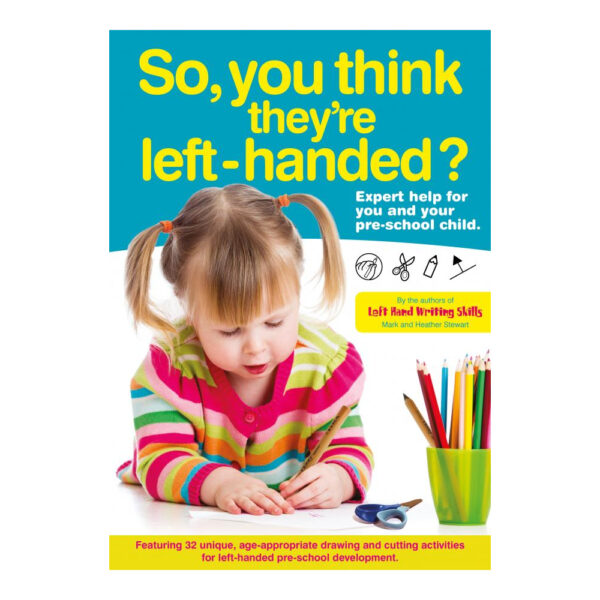Read our latest blog post: Left-handed section in “Play Matters” Publication
Read our latest blog post: Left-handed section in “Play Matters” Publication

£9.95
“So You Think Theyre Left-Handed?” Book.
You may have noticed that your preschool child does things with one hand in preference to the other or maybe they swap from one to the other. But how can you be sure which will eventually be their dominant hand for writing? And can a child be left-handed, but right-footed and perhaps left-eyed?
This book helps parents and carers to spot the early signs of side-dominance. It also provides 32 enjoyable structured activities for preschool children, who you think may prefer to use the left rather than the right hand, as they learn to use pencils, pens and scissors.
The 32 activities comprise of 16 pre-letter formation pencil activities at 3 different levels, and 16 colouring and cutting activities again at 3 different levels. There is also a completion certificate.
Each sheet contains reminders for page position and pencil grip, and leads pre-school children through a range of different exercises designed as preparation for their school life.
This book is NOT PHOTOCOPIABLE.
Here is some feedback from a Brazilian lady, Emanuella Correia, who has a left-handed child
Written in a pleasant and accessible language, the most recent book of Mark and Heather Stewart, “So, you think they´re left-handed?” is innovative at proposing observation activities, so all the family or friends can find out their own dominance.
The idea is to demonstrate to the children that although most of the family members or friends write with the right hand, someone in the family may use the left eye to look through the telescope or a friend may use the left foot to kick the ball. That means, in short, that most of us have something different and that is ok. For me, that seems an amazing resource for a left-handed child to understand its own difference and easily accept it.
The book manages, in a playful way and with easy reading text, to help adults to identity the child’s dominant hand, helping the child, as it follows, to improve his or her fine motor skills.
Additionally, the book offers to parents or guardians a letter to be presented to the school, indicating the specific needs of a left-handed child.
I was pleased and impressed with the quality of the work. The purchase was definitely worthy, because, although I already know my daughter is left-handed, I found out clear guidance on how to evaluate her eyes and foot dominance. Besides, the proposed activities has helped us to develop her motor skills.
I enjoyed the book so much that I suggested the authors to contact the publishers to analyze the possibility of a translation to Portuguese. I do believe that many Brazilian and Portuguese families could benefit from it.

You must be logged in to post a review.
Reviews
There are no reviews yet.